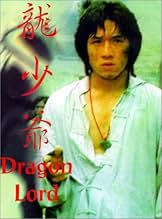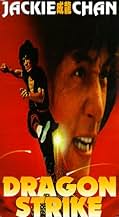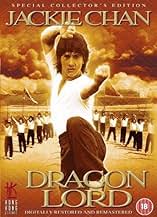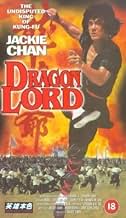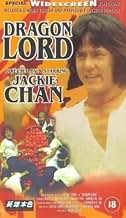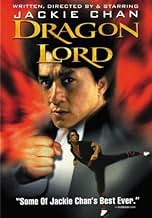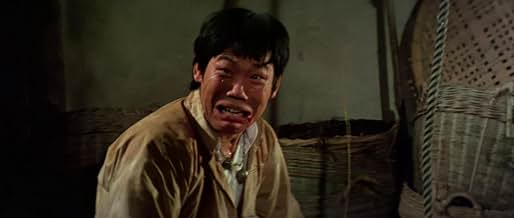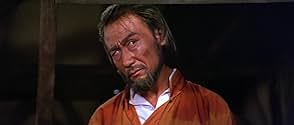CALIFICACIÓN DE IMDb
6.3/10
4.8 k
TU CALIFICACIÓN
Agrega una trama en tu idiomaThe adventures of a restless martial arts student called Dragon, who, while constantly pursuing a girl, gets involved in the affairs of a gang of thieves.The adventures of a restless martial arts student called Dragon, who, while constantly pursuing a girl, gets involved in the affairs of a gang of thieves.The adventures of a restless martial arts student called Dragon, who, while constantly pursuing a girl, gets involved in the affairs of a gang of thieves.
- Dirección
- Guionistas
- Elenco
- Premios
- 1 nominación en total
Michael Wai-Man Chan
- Tiger
- (as Hui-Min Chen)
Shirley Yim
- Alice
- (as Sidney Yim)
In-shik Hwang
- The Big Boss
- (as Ing-Sik Whang)
Fung Hak-On
- The Killer King
- (as Ke-An Fung)
- Dirección
- Guionistas
- Todo el elenco y el equipo
- Producción, taquilla y más en IMDbPro
Opiniones destacadas
`Dragon Lord' is more of a comedy than a martial arts movie. There are a few action sequences in the movie - a strange ball tournament at the beginning, a scuffle between Jackie and his friend over a girl, an interesting shuttlecock game in the middle of the movie - but there are really only two fight sequences in the movie, both near the end. Despite this, the movie's great. It's never dull. There are some funny moments, and the final fight scene between Jackie and the baddie is awesome. Definitely worth seeing over `Shanghai Noon' or `Rush Hour'.
Work-shy student Dragon (Chan) and his madcap pal Cowboy (Mars) spend their days getting up to mischief, frustrating the elders, chasing girls, and competing in the village sport - in which contestants scramble to the top of a tall wooden pyramid, the "bun tower", to retrieve a golden ball, rugby-fashion. When Dragon overhears a fiendish plot by smugglers to sell China's national treasures overseas, the pair leap into action. Also, Cowboy's wealthy father is kidnapped by the villainous and lethal Big Boss (In-Sik), and the scene is set for a furious martial arts showdown.
An attempt to claw back some native credibility after his first US outing The Big Brawl (1980) flopped Stateside, Dragon Lord saw Chan returning to Taiwan to work on a sequel to his directorial debut Young Master (also 1980). It would be ultimately abandoned - along with months of wasted footage - for a confused, if enjoyable affair, with no real script.
Accordingly, Dragon Lord also crashed and burned at Hong Kong theatres, much to the director's chagrin, who'd attempted to "make a new kind of action picture". As Chan told 'Combat' magazine years later: "I got rid of the kung fu and tried to put in sports, but I found that the audience didn't want that." But if Dragon Lord almost shot down Chan's rising star there and then, it did set a template for successive hits; tightly-choreographed acrobatics taking precedence over traditional Shaolin combat-styles; outtakes featuring aborted stunts over the credits; a winning goofy charm.
Stand-out sequences include a Badminton-like game played with shuttlecocks (but no bats), and the climactic fight between Mars, Chan and real-life Taekwondo master In-Sik, which is both simultaneously deadly and near-clownish (if this film had an overall sound it would be "Boiinngg!", or possibly "Kuhumperwhumpf!").
An attempt to claw back some native credibility after his first US outing The Big Brawl (1980) flopped Stateside, Dragon Lord saw Chan returning to Taiwan to work on a sequel to his directorial debut Young Master (also 1980). It would be ultimately abandoned - along with months of wasted footage - for a confused, if enjoyable affair, with no real script.
Accordingly, Dragon Lord also crashed and burned at Hong Kong theatres, much to the director's chagrin, who'd attempted to "make a new kind of action picture". As Chan told 'Combat' magazine years later: "I got rid of the kung fu and tried to put in sports, but I found that the audience didn't want that." But if Dragon Lord almost shot down Chan's rising star there and then, it did set a template for successive hits; tightly-choreographed acrobatics taking precedence over traditional Shaolin combat-styles; outtakes featuring aborted stunts over the credits; a winning goofy charm.
Stand-out sequences include a Badminton-like game played with shuttlecocks (but no bats), and the climactic fight between Mars, Chan and real-life Taekwondo master In-Sik, which is both simultaneously deadly and near-clownish (if this film had an overall sound it would be "Boiinngg!", or possibly "Kuhumperwhumpf!").
For a Jackie Chan movie, then "Dragon Lord" was a fairly mediocre experience. There wasn't the usual Jackie Chan magic or personal touch to this movie. The movie tried too hard to mix comedy and serious action, and it just didn't go well together.
The movie was also weighed down by a storyline that was intended to be serious, but trying to incorporate slapstick comedy, and again it was to an extend where it just didn't fully work as intended. And it didn't help the movie one bit that it had a couple of scenes that were taking too long to execute. Especially the last fight scene, it was dragging on for a very long time, and it started to become stale and somewhat of a parody to watch.
So what worked in this movie? Well, the fighting and the action, of course. As to be expected, as this is a Jackie Chan movie after all. As with most of his other movies, the martial arts and action scenes were well executed and brought to the screen.
I am a big fan of Jackie Chan, and must admit that "Dragon Lord" is not amongst the best of his entire movie career. But bear in mind that this movie is from 1982. That being said, then it should be stated that it is not his worst movie either. But it is, of course, a movie that is well deserved a place in the DVD collection of any Jackie Chan fan. Just sad to say, that this isn't really the type of movie that you watch more than once.
The movie was also weighed down by a storyline that was intended to be serious, but trying to incorporate slapstick comedy, and again it was to an extend where it just didn't fully work as intended. And it didn't help the movie one bit that it had a couple of scenes that were taking too long to execute. Especially the last fight scene, it was dragging on for a very long time, and it started to become stale and somewhat of a parody to watch.
So what worked in this movie? Well, the fighting and the action, of course. As to be expected, as this is a Jackie Chan movie after all. As with most of his other movies, the martial arts and action scenes were well executed and brought to the screen.
I am a big fan of Jackie Chan, and must admit that "Dragon Lord" is not amongst the best of his entire movie career. But bear in mind that this movie is from 1982. That being said, then it should be stated that it is not his worst movie either. But it is, of course, a movie that is well deserved a place in the DVD collection of any Jackie Chan fan. Just sad to say, that this isn't really the type of movie that you watch more than once.
This film has to be viewed in the right frame of mind. First, the central father-son relationship makes it pretty clear that the film was intended as a prequel to his Wong Fei Hung film "Drunken Master" (ideas from this film recur in "Drunken Master II), and not "Young Master"; that Chan backed away from this plan and renamed the characters indicates that he himself was not convinced the material was coming together properly; and, indeed, the film conveys a sense of being incomplete; for instance, the romantic relationship around which half the plot turns is left utterly hanging at the end of the film. "Young Master", from the same period, also feels underdone, but at least all its central threads are tied together at the end. This film feels as though Chan wrestled with the plot and characters trying to find his central theme, only to abandon the effort, possibly due to time and budget.
Or perhaps the film is simply over-ambitious. This is an important turning point film in Chan's career, because he commits himself to development of the central character above all other concerns - which is why there's such a lack of kung fu throughout the film. Chan wants to make an historical romantic comedy that just happens to have kung fu in it. But both the historical element and the romantic element come across as little more than plot-twists.
That leaves us with the comedy. Since Chan's concern is character-development, the comedy is largely character driven - as in the conflict between Chan's character and his best friend, an argument over a girl. But there's plenty of slapstick as well. Frankly, I find the comedy amusing enough to forgive the incompleteness of the plot.
This film represents an effort on Chan's part to find a viable formula that he can use and develop over time. It doesn't quite work, and Chan would only find that formula after abandoning the historical elements of his earlier films, with the making of the contemporary action comedy "Police Story". But going back to view this film is still very informative as to how Chan worked his way through the historical genre, and perhaps why he abandoned it.
Or perhaps the film is simply over-ambitious. This is an important turning point film in Chan's career, because he commits himself to development of the central character above all other concerns - which is why there's such a lack of kung fu throughout the film. Chan wants to make an historical romantic comedy that just happens to have kung fu in it. But both the historical element and the romantic element come across as little more than plot-twists.
That leaves us with the comedy. Since Chan's concern is character-development, the comedy is largely character driven - as in the conflict between Chan's character and his best friend, an argument over a girl. But there's plenty of slapstick as well. Frankly, I find the comedy amusing enough to forgive the incompleteness of the plot.
This film represents an effort on Chan's part to find a viable formula that he can use and develop over time. It doesn't quite work, and Chan would only find that formula after abandoning the historical elements of his earlier films, with the making of the contemporary action comedy "Police Story". But going back to view this film is still very informative as to how Chan worked his way through the historical genre, and perhaps why he abandoned it.
One from early in his career the movie has everything that would make him a Kung Fu super star.
It's a great comedy about a spoiled rich brat trying to send a love note via a kite but ends up stumbling onto a plot to steal China's artifacts.
It's the type of friendly kung fu flick for all the ages that Jackie Chan would become known for. Thought the stunts are small compared to the extreme risk he would take in the future, it was still impressive to see Jackie do the physical stuff not just the kung fu but there were scenes of Jackie and his friends playing sports similar to football but more extreme.
Extremely entertaining!!!
It's a great comedy about a spoiled rich brat trying to send a love note via a kite but ends up stumbling onto a plot to steal China's artifacts.
It's the type of friendly kung fu flick for all the ages that Jackie Chan would become known for. Thought the stunts are small compared to the extreme risk he would take in the future, it was still impressive to see Jackie do the physical stuff not just the kung fu but there were scenes of Jackie and his friends playing sports similar to football but more extreme.
Extremely entertaining!!!
¿Sabías que…?
- TriviaAt the time this film held the world record for a scene that needed the most takes, over a thousand for the "shuttlecock soccer" scene.
- ErroresAround 1h19m (the barn fight scene), Cowboy (Mars) gets kicked off the loft by the Big Boss (Ing-Sik Whang). Dragon (Jackie Chan) is situated near the middle of the ladder. Just as the Big Boss kicks him in the back, the next cut shows him at the top of the ladder.
- Créditos curiososScenes of out-takes from the action scenes play under the credits.
- Versiones alternativasSome early international releases of this film were shorn of the sequence in which Dragon is forced to recite poetry. This is most likely because it was deemed to be something that would have confused audiences unfamiliar with the culture.
- ConexionesFeatured in Jackie Chan: My Story (1998)
Selecciones populares
Inicia sesión para calificar y agrega a la lista de videos para obtener recomendaciones personalizadas
Detalles
Contribuir a esta página
Sugiere una edición o agrega el contenido que falta

Principales brechas de datos
By what name was Lung siu yeh (1982) officially released in India in English?
Responda

